- Home
- Peter Carey
Oscar and Lucinda bw-1988 Page 42
Oscar and Lucinda bw-1988 Read online
Page 42
"And what would you say to Mr Hopkins here, if he were to tell you his intention to go by land?"
"Beg yours?" said Mr Jeffris who was genuinely perplexed.
"Mr Hopkins intends to travel to Boat Harbour by land."
"No," said Mr Jeffris, too surprised to be bad-tempered any longer. He turned to look at Oscar who had the feeling that he was being seen by Mr Jeffris for the first time. "Is this so, Mr Hopkins?"
"I am afraid it is."
"And why not water?" said Mr Jeffris. His tone had changed. It was gentler. You could see the echo of it in his eyes.
"And why not water?" he repeated.
"I have my own reasons."
Mr Jeffris's normal mood was that of a man whose temper was a large rock balanced precariously on a rusty nail. His clerks were inclined to walk around him on tiptoe. But now, as he regarded Oscar, he
338
The Weeks before Christmas
somehow made himself go soft and calm. The rock lowered itself on to the sand.
"These reasons," he said gently, "would all be categorized under the label 'exploration'?"
"Oh, no," said Oscar, and giggled.
Mr Jeffris's forehead made a complicated frown.
"He refuses the steamer/' said Mr d'Abbs.
Mr Jeff ris did not even look at Mr d'Abbs. "And you must go?" he asked Oscar softly, so softly that Lucinda could not believe this was the same man she had thought a "dangerous dog" when he had come clicking across the clerk's office in his metaltipped shoes.
"For your own reasons," suggested Mr Jeffris, "you are compelled to make this journey?" Oscar smiled at Mr Jeffris. He did not smile because he was happy. He smiled because Mr Jeffris's manner had made him frightened of what he had taken on himself. He smiled because he wished to lighten the grave solicitousness of Mr Jeffris's expression. But Mr Jeffris would not comply. He looked at Oscar sadly, up and down, as if he were a beast at Homebush saleyards who must be called to shoulder a burden in excess of its strength.
"I would not be you," said Mr Jeffris, "for anything." Oscar felt his windpipe knotting. He stroked his long neck and turned his "smile" to Mr d'Abbs. Mr d'Abbs was pleased. He was pleased with the resources of his office. He was pleased to offer these services to his clients and give them free, gratis.
"Thank you, Jeffris," he said. "Back to the troops now." Lucinda thought how arrogant and dismissive this was, but it was not arrogance, only the impersonation of arrogance, something Mr Jeffris permitted him in public. Mr d'Abbs undid his pen and drew-no one could see what he rendered-a lovely little barque with a seagull overhead.
"And so," he said.
He added some waves.
"And so," he screwed back the pen top, "you will obviously be transporting your prefabricaton on the sea."
"Perhaps we should discuss it further," Lucinda said to Oscar.
"Good lady," said Mr d'Abbs, "what is there to discuss?" Oscar stood. He saw the childish drawings on Mr d'Abbs's pad. His face was triangular, chalkybone, skin, locked-up eyes. Luanda's heart
Oscar and Luanda
was filled with pity. Oscar sat down again. He could not have been more terrified if he had sat, once again, inside a cage on Southampton Pier.
85
A Prayer
It was half past six in the evening and very hot. A feeble light entered the staircase from a high window, but not sufficient to show the decrepit state of the wallpaper or the condition of the runner. Mr Jeffris walked up the stairs with his gloved hands clasped together as if he might inadvertently touch something he would find repulsive. When he reached the first landing he plunged off into a dark passage, walking briskly where a stranger to these lodgings would have been compelled to pause and strike a match or feel the way along the wall. He rose two steps, turned to the left, and stopped at a doorway which was not only locked but padlocked. He did not fuss with his keys. The door lock made a dull "thuck," the padlock a sharp brass
"snick." The knob rattled. Mr Jeffris was home.
It was a small room with a window looking out at other windows and down into a small cobbled yard where three large black cats, the pets of the lodging-house cook, lay on top of a pile of lumber and grey rags.
The room was hot. Mr Jeffris threw open the window, pulled a face at what he smelt, and halfclosed it again. Two or three blow-flies entered the room and began, once they were there, to buzz and crash heavily against the glass. Mr Jeffris ignored them.
He removed his frock coat. It had wide shoulders and a narrow waist, and although the style was almost thirty years out of date, the condition of the nap was such that one could only
un
A Prayer
conclude that it had been recently tailored. Mr Jeffris placed this coat on a wooden hanger, brushed it, and hung it on the long rail he had himself suspended from the picture rail and then-it was a complicated system involving a triangulation of forcesheld out from the wall by a length of twine which dissected the air above his bed and was secured to a picture rail above its head. When Mr Jeffris sat on his bed (which he now did as he removed his boots) his knees almost touched the heavy bookcases which he had constructed himself in the same neat and handy style with which he had made all the other improvements in the room. Everything was at once temporary and sturdy. It would serve for a decade. It could be packed in a moment. It was, in short, a "camp."
At the foot of the bed there was a clear area marked by a sun-faded rug. Two dumb-bells, placed to one side of this rug, announced the purpose of this extravagance of space in so small and cramped
a room.
As he sat on the side of his bed, his hands placed flat on his knees, he exhibited such a perfect stillness that he might have been at prayer.
In fact, he was beside himself. He sat still as you might sit still on the edge of an abyss, or at the top of a pole, or on a tightrope strung between your lodgings and the country of your dreams. There was a silver-backed mirror and a comb in a carved chest on his bookshelf. He could reach them without moving from his seat. And when he leaned across and removed them it was easy to see that the chest was placed in this position for this reason. And when he combed his moustache, which he did now, slowly, very slowly, the action had the quality of a prayer or a meditation practised daily. He had a long lip and the hair was thick and luxurious. When he had had enough of combing he reached for the barber's scissors, he held up the silver-backed mirror and then snipped a little here and there. Only the movement of his broad chest betrayed his agitation.
All of his adult life had been spent in preparation for the day when he should survey unmapped country, have a journal, publish a map. Three times he had been employed on journeys of exploration and three Mmes he had resigned before the party had its animals purchased. He had standards, those of his hero, Major Mitchell, and he had no intention of lurching around the country with incompetents, idiots
Oscar and Lucinda
blindly putting one foot after the next and-no matter what names they named or maps they drewhaving no idea, in a proper trigonometrical sense, where on earth they were. Hume, Hovell, Burke, Eyre had all drawn their maps badly. They were useless for both settlement and exploration, but their authors were heroes and Mr Jeffris was a clerk in an office in Sydney. Mr Jeffris, against hope, against all good sense, had prepared himself as Major Thomas Mitchell would have him do. He had copied from Mitchell's Memoirs his self-deprecating advice to those who would follow him. Mr Jeffris had him. Mr Jeffris had executed the Major's prose in his admirable copperplate; he had made a frame for it; he had hung it above his bed. A little mathematical knowledge will strengthen your style, and give it perspicuity. Study the writings of great men. I would place Cae-| sar's Gallic Wars at the top of any list, but would advise you not ne-|, gleet Pliny, Plutarch, Sallus and Seneca. Study these writings both I for the subject and the manner in which they are treated. Arrangement is a material point in voyage writing as well as in history: I feel great diffidence here. Sufficie
nt matter I can always furnish, and fear not to prevent anything unseamanlike from entering into the cornposition: but to round a period well, and arrange sentences so as to place what is meant in the most perspicacious view, is too much for me. Seamanship and authorship make too great an angle with one another. He would have copied more had the sheet of paper he had begun with been sufficient, for there was something of the actor in Mr Jeffris, and when he wrote the words of his hero on this piece of paper he felt himself become their author whose own frock coat (in an engraving dated 1835) bore a striking similarity to the one that Mr Jeffris had had made in 1864. Following the advice of Major Mitchell had led Mr Jeffris into areas a coster's son might not normally expect to enter. He had taught himself Latin so he might read what he must know. He had studied water-colour technique in order that he might record the landscapes of the New World. He had spent five years of his life as a brown-nose, arse-licking apprentice, assistant, dogsbody to the incompetent, asthmatic Mr Cruikshank in order that he might master that science which Mitchell placed above all others: surveying. He had come to Sydney that he might study under Mr Martin (the oil painter) and in so doing he had ended up;
A Prayer '
employed by Mr Martin's friend, Mr d'Abbs.
Mr Jeffris could not tolerate incompetence. He could quote scripture to support his view. He could not differentiate it from sloth. It was an offence to God who made us in His image. And yet he found it everywhere. It was as common as dust. There was not a man he had served who had been free from Mr Jeffris's censure.
Mr d'Abbs was incompetent. It was a wonder he had any business at all, and would not have had if he had not set up his kitchen and his cellar in the service of the fuddled complacent friendship of his dinner table. It was all social. That was obvious. He sat down with them at dinner. They drank too much wine and put their arms around each other. They imagined they discussed Philosophy and Great Issues when they could barely pronounce the names of the men they misquoted. He was "good old Jimmy d'Abbs," but he was a tosspot and incompetent. He could not add up. He could not bother to add up, and yet such was the condition of life that Mr Jeffris was called upon to serve him. It made Mr Jeffris angry, angry every minute he was in the office. He spent his days leashed in, trussed up; he could hardly bear to be there, except he must. But one day he would go. One day he would not be there to make sure the work was done correctly, and then all the second-rate firms who had grown to trust the idiot would find themselves in fearful trouble. D'Abbs would never have a head clerk as good, not because there were not others to be had, but because he would not know how to recognize one.
Jeffris had dreams about d'Abbs. He dreamed he slapped him and stabbed him in his sparrow's chest.
But now, like an ass which God has given frankincense to carry, d'Abbs had brought him this gift-an incompetent clerk who had it in his head he would go to Boat Harbour, by land, across unmapped territory. He was a frail little thing, a skippy girl with milk-white skin and a weakness for poker.
With a patron, wrapped and sealed, in tandem.
Mr Jeffris sat very, very still. He must be careful. He must approach the matter as if it were a timid animal, a little birdie to be trapped-no, not trapped, he was not strong enough to think himself a predatorbut to be coaxed, persuaded, wooed.
Mr Jeffris stood and then kneeled. There was barely room for him to squash in between the bookcase and the bed. It was a week Before Christmas. He asked God that he might be granted this Great Journey.
7:;:™tW;;:',:;/
••• ' 3»«Kvl J*«s>••. <>, ••• -
'(3^yias;p%,
«:•/'«
That Lucinda should greet Mr Jeffris so enthusiastically when he arrived uninvited at her back door late on Christmas night, his arms full of presents, a bottle of warm colonial hock under his arm, should shake his square short-fingered hand and bring him into the parlour and thus ignore all her intuitions about the man she had privately likened to both a spider and a vicious dog, was merely one more product of the devastating sermon the Reverend Mr Dight had preached that morning, Christmas Day.
The reverend gentleman had not planned this controversial sermon, although Mr Chalmers, the warden of the vestry, was always at him with his "Do not be afraid to make a ruckus." But Mr Chalmers was in trade (three butchers' shops with prices writ in whitewash on their window panes) and was too often inclined, the Reverend Mr Dight thought, to regard the building of a Christian congregation as being no different from establishing good will in the High Street. Mr Dight knew his warden to be delighted with his sermon for, in the midst of his passionate address, he had looked down into his congregation and seen, in the midst of two hundred grave and attentive faces, Mr Chalmers's round and polished countenance wreathed in smiles. Mr Chalmers imagined that his nagging for a ruckus had at last produced results, but the Reverend Mr Dight had not planned the sermon. It is possible that he had it in his mind, that he carried it, like black flies on a sweat-damp back, without knowing it was there. But it was only when he stood in his pulpit-in that moment before he would begin to fiddle with his bookmarks-that he saw that They (the fornicators, gamblers) had dared to show their impudent faces on this holiest of days, and then the black flies rose in a fury, and he took for his text, not the Good News he had marked, but rather Matthew
5:27–30. "Ye have heard it said by them of old time, thou shall not commit adultery."
Christmas Day
He then had the pleasure of seeing his impromptu sermon take effect as his most carefully prepared addresses never had. There was a ripple, a shiver that'moved across the congregation like wind across the face of a pond. He froze them. He had them so quiet they hardly dared unfold their arms or cross their legs the other way. They formed a human lock around the two fornicators who sat rigid in their pew, their red necks advertising guilt. On Christmas Day the sky was a rich cobalt blue. The grass at Whitheld's Farm (being understocked) was long and golden and crackling underfoot.
The day had seemed perfect to Lucinda in every detail. She and Oscar had set a table in the garden before they left for church. The jacaranda had lost its flowers and was now a feathery umbrella of cool green. A soft nor'easter came off the harbour. They placed their presents on the parlour hearth and walked through the embarrassing plenty of Whitheld's Farm (all of New South Wales was in the grip of drought, and all the feed between Sydney and Bathurst was eaten down to the roots) through all the golden grass to church. Oscar said the colours felt wrong for Christmas. Lucinda said the colours in Bethlehem must surely have been like this: this dazzling blue sky, this straw-gold earth, and not the cold and bracken-brown of pagan Britain. Oscar smiled at her, his eyes glistening.
She thought: He does love me. And if his behaviour is always proper, then it is perverse of me to be irritated with him because of it. I could not respect him if he were to act improperly, to place, like Mr d'Abbs or Mr Paxton, his hand upon my knee.
She accepted the glistening fluid that threatened to spill over his lower lids as the exact equivalent of a kiss and she was moved, and excited, and bowed her head and fixed her bonnet although she had not planned to do so until they were amongst the new houses of Balmain. And then there was the sermon.
She felt herself slapped and spat on and all that landscape which she had smugly celebrated not half an hour before-she had gone on and on, naming trees and birds for her companion-now seemed a hateful place-dry, harsh, a tinder-box with black snakes coiled amongst its deadly grasses.
The urge to cry was so strong she must battle with her body to subdue it. She bit her lip and breathed through her mouth. She ran the gauntlet of the crowded churchyard with her face blazing red. She thought: They hate me, and it is not only the men. Oscar said: 'They do not even know us," but this voice was high and
Oscar and Lucinda
nervous. This tone was no help. She drew away from him.
"I cannot speak," she managed. She took off her bonnet and, in her agitation, wrapped it arou
nd her prayer book while they were still in sight of the church.
"It was a most unchristian sermon," said Oscar to whom had come, in the midst of all this turbulence and upset, the following very simple thought: It is my duty to save her name; there is no question but that I must propose marriage to her. This thought was both respectable and gentlemanly, but because it so neatly coincided with his own desires, he could not believe it uncorrupted. "Most unchristian," he repeated.
"Oh, do not be so hurt," she snapped.
"It is on your behalf I hurt."
"I thank you, but on my behalf it would be best if we did not discuss the matter." Lucinda did not like herself like this. She knew herself wrong and also in the wrong. She was poisoned by that hateful sermon, by its crudeness, its intolerance, its certainty of its own whiskyand-tobaccosmelling strength. And now she snapped and slapped at the one soul whose goodness and kindness she would not question. She was acting like a spoiled child, like her mother had acted on the days when her daughter hated her, and although she knew all this, she could not stop herself. She was tearing Christmas Day to shreds.
She had put such store in this day, and not merely in the care with which she chose a turkey and a pair of pale blue poplin shirts for her dear friend. In her imagination she had seen all the unspoken things between them come, at last, to be spoken of directly. She had imagined the shirts laid across the faded damask of the parlour armchair, seen crumpled paper and golden ribbon discarded on the blood-red Turkish rug. And other things, like kissing, but not quite so sharp and clear, with furry unfocused edges like a water-colour.
But now she could not bear the way she sounded. She was not a person anyone could love. She drew herself into herself, and when they let themselves into the cottage she could not even look at the table she had set with so many feverish thoughts. She told herself: It does not matter what bigots think of me.
But it did matter. She could not bear to be so hated.
She took down the chipped brown-glaze tea-pot. She put the kettle on the stove and riddled the grate and then, feeling her tears well up inside her, she hurried upstairs to her room. Oscar saw the tumescent top lip and understood her intention. She was going to her room to cry.

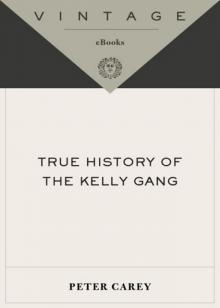 True History of the Kelly Gang
True History of the Kelly Gang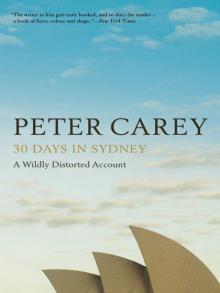 30 Days in Sydney: A Wildly Distorted Account
30 Days in Sydney: A Wildly Distorted Account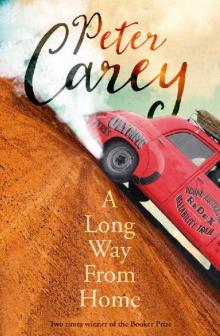 A Long Way From Home
A Long Way From Home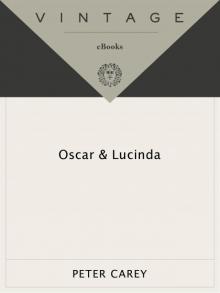 Oscar and Lucinda
Oscar and Lucinda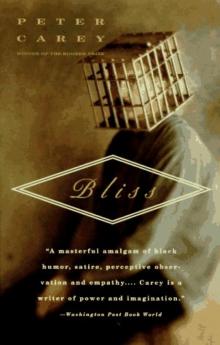 Bliss
Bliss Wrong About Japan
Wrong About Japan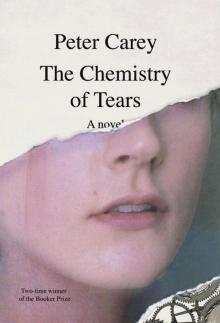 The Chemistry of Tears
The Chemistry of Tears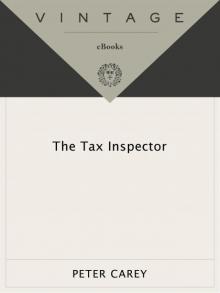 The Tax Inspector
The Tax Inspector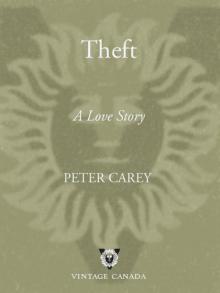 Theft: A Love Story
Theft: A Love Story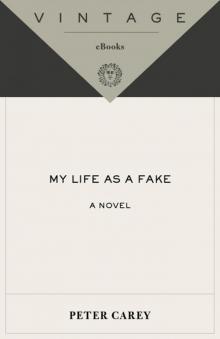 My Life as a Fake
My Life as a Fake Collected Stories
Collected Stories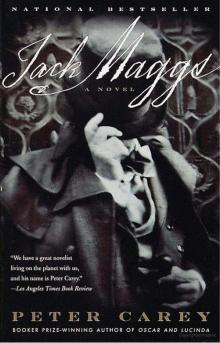 Jack Maggs
Jack Maggs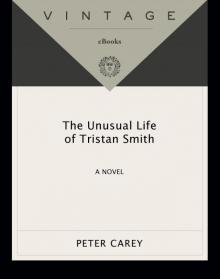 The Unusual Life of Tristan Smith
The Unusual Life of Tristan Smith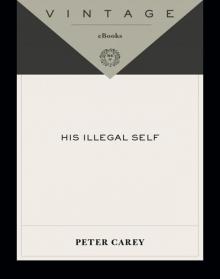 His Illegal Self His Illegal Self His Illegal Self
His Illegal Self His Illegal Self His Illegal Self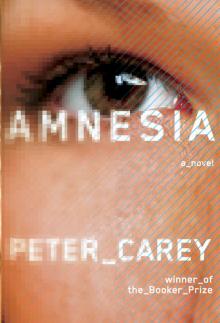 Amnesia: A Novel
Amnesia: A Novel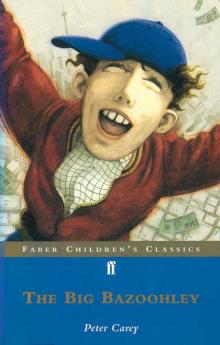 The Big Bazoohley
The Big Bazoohley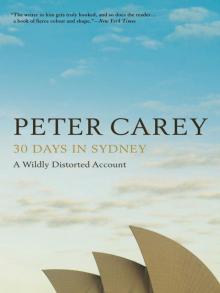 30 Days in Sydney
30 Days in Sydney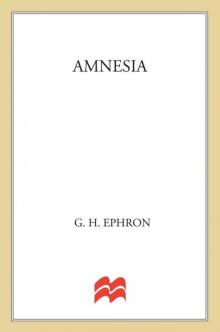 Amnesia
Amnesia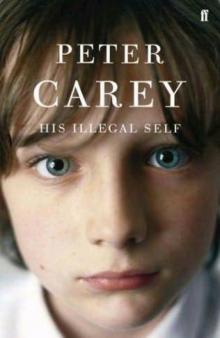 His Illegal Self
His Illegal Self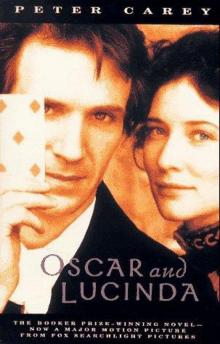 Oscar and Lucinda bw-1988
Oscar and Lucinda bw-1988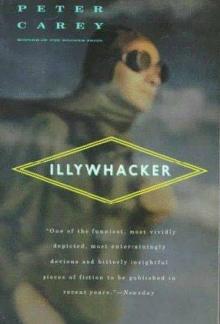 Illywhacker
Illywhacker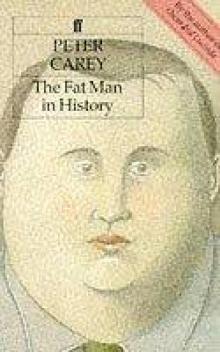 The Fat Man in History aka Exotic Pleasures
The Fat Man in History aka Exotic Pleasures